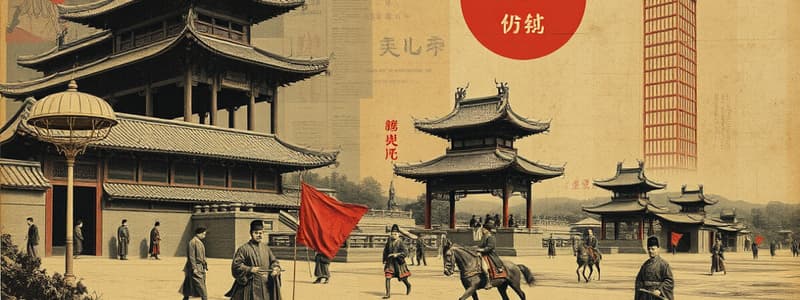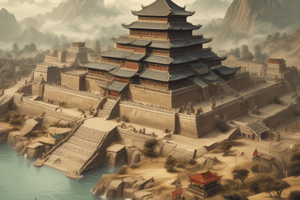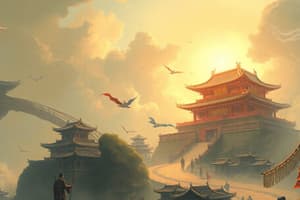Podcast
Questions and Answers
Who led a rebellion against the Shang?
Who led a rebellion against the Shang?
An aristocrat named Wu Wang.
When did the rebellion against the Shang take place?
When did the rebellion against the Shang take place?
In 1045 B.C.
How long did the Zhou rule?
How long did the Zhou rule?
For more than 800 years.
What gave the Zhou rulers the right to rule?
What gave the Zhou rulers the right to rule?
What is a bureaucracy?
What is a bureaucracy?
What did the Zhou king copy from the Shang rulers?
What did the Zhou king copy from the Shang rulers?
Who helped the Zhou king rule over territories?
Who helped the Zhou king rule over territories?
How did those who ruled over the territories get the right to rule?
How did those who ruled over the territories get the right to rule?
Under Zhou rule, who was the link between heaven and earth?
Under Zhou rule, who was the link between heaven and earth?
What were the Zhou king's religious duties?
What were the Zhou king's religious duties?
How did a man in the Zhou dynasty receive the Mandate of Heaven?
How did a man in the Zhou dynasty receive the Mandate of Heaven?
What are the two ways the Mandate of Heaven worked?
What are the two ways the Mandate of Heaven worked?
What was the only way the people could question the Mandate of Heaven?
What was the only way the people could question the Mandate of Heaven?
What were some of the farming accomplishments of the Zhou dynasty?
What were some of the farming accomplishments of the Zhou dynasty?
What were the results of these farming accomplishments?
What were the results of these farming accomplishments?
Under the Zhou, how far did they trade their silk?
Under the Zhou, how far did they trade their silk?
Why did the Zhou dynasty weaken?
Why did the Zhou dynasty weaken?
When did the period known as the Warring States begin in China?
When did the period known as the Warring States begin in China?
How did the fighting change during the Warring States?
How did the fighting change during the Warring States?
What weapons did the nobles use during the Warring States?
What weapons did the nobles use during the Warring States?
What did the Chinese invent that let soldiers ride horses?
What did the Chinese invent that let soldiers ride horses?
Who became the new ruler over China in 221 B.C.?
Who became the new ruler over China in 221 B.C.?
Flashcards are hidden until you start studying
Study Notes
Zhou Dynasty Overview
- Wu Wang led a rebellion against the Shang dynasty in 1045 B.C.
- The Zhou dynasty ruled for over 800 years, marking a significant period in Chinese history.
- Zhou kings derived their power from a concept of heavenly law, legitimizing their rule.
Government Structure
- Bureaucracy was established, consisting of appointed officials responsible for various government functions.
- Zhou kings adopted governmental practices from Shang rulers, focusing on kingdom defense.
- Aristocrats were entrusted with leadership over territories, creating a hierarchical governance structure.
Mandate of Heaven
- The king acted as a crucial link between heaven and earth according to Chinese belief.
- Religious duties included performing rituals to maintain divine favor.
- The Mandate of Heaven relied on the king's talent and virtue, which legitimized their rule.
Role of the People
- The Mandate of Heaven set expectations for the king to rule righteously; failures could signify a loss of divine approval.
- Overthrowing a dynasty was the only means for the populace to challenge the Mandate of Heaven.
Agricultural Innovations
- The Zhou dynasty saw advancements in irrigation and flood control systems, enhancing agricultural productivity.
- Improvements in farming tools contributed to increased crop yields and population growth due to food surplus.
Trade Expansion
- The Zhou dynasty expanded silk trade routes through Central Asia, reaching as far as Greece, indicating robust trade relations.
Decline of the Zhou Dynasty
- Over time, local rulers gained power and autonomy, leading to a decline in loyalty to the Zhou kings.
- The period of the Warring States began in 403 B.C. as a result of fragmented governance.
Military Developments
- During the Warring States, innovations like the saddle and stirrup allowed soldiers to effectively use weapons while mounted.
- Nobles’ armies utilized swords, spears, and crossbows, indicating advancements in military technology and strategy.
Unification of China
- In 221 B.C., the ruler of Qin became the new ruler over China, marking the end of the fragmented Warring States period.
Studying That Suits You
Use AI to generate personalized quizzes and flashcards to suit your learning preferences.




